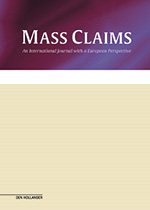Mass Claims
An international journal with a European focus
2023 nr. 2
Redactie
Hoofdredactie M. de Monchy
|
Redactie Susanne Augenhofer D. Duncan Fairgrieve J. Kortmann T. Schreiber I. Tzankova
|
Inleiding
Lee Rosenthal1The UK and EU, among other countries, have been diligent and avid students of United States mass tort and mass claim litigation. Papers abound on whether there are good American litigation practices that might fit other nations' approaches to mass claims, without opening the door to the oft-decried American litigation abuses. American legal scholars are similarly eager to learn about class and mass litigation practice... ...lees meer
Artikel
Henner Schläfke and Tobias Lühmann1Germany is known to be hesitant and sometimes even reluctant when it comes to collective redress and has been somewhat late to the party. Is this also true when it comes to the transposition of the Representative Actions Directive? The German Act on the Transposition of the Representative Actions Directive came into force on 13 October 2023. It is the result of much debate within the government and parliament and, as such, a compromise that seeks to strike a balance between the interests of consumers and businesses. Although the scope of representative actions for redress mea... abonneren of dit artikel .
Aljoša Krdžić, Žan Klobasa, Kristina Sajovic and Sebastijan Lugarič1Selected Topics and Related Opportunities For Improvement Although the Slovenian Collective Actions Act was adopted in 2017,[2] no collective action for damages pertaining to consumer rights has yet been finally concluded, leaving many questions untested in the judicial practice. In this article, we focus on the questions of standing of eligible entities, especially regarding the condition of "ungainful" activity, the regulation of costs and funding in light of the general aim of the Collective Actions Act of ... abonneren of dit artikel .
Stien Dethier1Re-allocating Excess Funds to Fund New Class Actions This article introduces and analyses residue funding, a funding method for class actions that allocates the possible residue awarded after winning the case to the original funder. Residue funding can be designed in two different models: an obligatory self-financing system or a return-on-investment system, through different funders. While some negative side effects of the proposed funding method would require additional attention, the smart allocation of excess funds through residue funding and its poten... abonneren of dit artikel .
Ianika Tzankova and Till Schreiber1 abonneren of dit artikel .
Pim Wissink1Case Note: The Hague District court 20 September 2023, ECLI:NL:RBDHA:2023:14036 (Airbus) and Amsterdam District court 25 October 2023, ECLI:NL:RBAMS:2023:6694 (TikTok) 1. Introduction This duo of cases presents notable decisions by lower courts pertaining to third-party funding of mass claims under the (amended) Dutch collective action regime (WAMCA). The decisions shed some welcome light on the courts' interpretations of admissibility requirements, in particular concerning the limits of a third-party funder's influence on the representative entity ... abonneren of dit artikel .
Anna Dannreuther and Gareth Shires1Case note: [2023] UKSC 28 On 26 July 2023, the UK Supreme Court ("UKSC") handed down its judgment in R (on the application of PACCAR Inc) v Competition Appeal Tribunal ("Paccar"). The case concerned litigation funding agreements ("LFAs") pursuant to which the funder was entitled to a percentage of any damages obtained. The issue was whether these constituted 'damages-based agreements' ("DBAs") and therefore had to comply with formal requirements set out in the Damages-Based Agreements Regulations... abonneren of dit artikel .
Overig
England and Wales, Germany, Italy, the Netherlands, Scotland, Spain
England and Wales
Anna Dannreuther
Case law
R (on the application of PACCAR Inc) v Competition Appeal Tribunal [2023] UKSC 28; [2023] 1 WLR 2594
On 26 July 2023, the UK Supreme Court (``UKSC") handed down its judgment in R (on the application of PACCAR Inc) v Competition Appeal Tribunal (``Paccar"). The case concerned litigation funding agreements (``LFAs"... abonneren of dit artikel .
Vorige edities
2025
2024
2023
2022
2021
Eerdere edities kunt u doorzoeken in het archief.
 RSS
RSS



 RSS
RSS